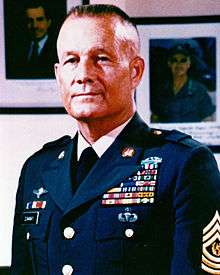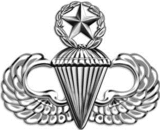George W. Dunaway
| George W. Dunaway | |
|---|---|
 SMA George W. Dunaway | |
| Born |
July 24, 1922 Richmond, Virginia |
| Died |
February 6, 2008 (aged 85) Las Vegas, Nevada |
| Allegiance | United States of America |
| Service/branch | United States Army |
| Years of service | 1943–1970 |
| Rank | Sergeant Major of the Army |
| Unit |
82nd Airborne Division 101st Airborne Division |
| Battles/wars |
World War II Vietnam War |
| Awards |
Army Distinguished Service Medal Silver Star Purple Heart Air Medal |
George W. Dunaway (July 24, 1922 – February 6, 2008) was the second Sergeant Major of the Army. He was sworn in on September 1, 1968 and served until his term ended in September 1970. He was born in Richmond, Virginia, on July 24, 1922 and died on February 6, 2008 in Las Vegas, Nevada.[1]
After attending the Airborne Course in August 1943, Sergeant Major Dunaway remained at Fort Benning, Georgia as an Airborne School Instructor until January 1945 when he joined the 517th Parachute Regimental Combat Team in France as a platoon sergeant. He returned to Fort Benning in December 1945 with assignment to the 501st Parachute Infantry Regiment where he served as first sergeant of Company "A". In March 1948, Sergeant Major Dunaway was reassigned to the 82d Airborne Division at Fort Bragg, North Carolina. There he became a member of the 505th Parachute Infantry Regiment as Operations Sergeant, ascending to the Regimental Sergeant Major position in 1952.
In early 1954 he transferred to the 187th Regimental Combat Team as the Combat Team Sergeant Major. He continued in that position for seven years during which he saw the Airborne Regimental Combat Team renamed as the 187th Infantry, when the 101st Airborne Division was reactivated on September 21, 1956, at Fort Campbell, Kentucky. Departing Fort Campbell in 1961, he took the reins of the 1st Special Forces Group, 1st Special Forces in United States Army Pacific and later moved to the 5th Special Forces Group in Vietnam, where he remained until June 1967.
Returning to the United States, he re-joined the 101st Airborne Division as it prepared to move to Vietnam in the largest unit deployment by air in the history of the Vietnam War. Sergeant Major Dunaway arrived in Vietnam with the commanding general's command group on December 13, 1967. In February 1968, he moved to Camp Eagle in the I Corps Tactical Zone with the division where he remained until July 1968 when he was selected as the second Sergeant Major of the Army.
Awards and decorations
 Combat Infantry Badge, 2 awards Combat Infantry Badge, 2 awards |
 Master Parachutist Badge Master Parachutist Badge |
| Army Distinguished Service Medal | |
| Silver Star[2] | |
| Legion of Merit | |
| Bronze Star Medal with Valor device and three oak leaf clusters | |
| Air Medal with Valor device and two silver oak leaf clusters | |
| Army Commendation Medal with oak leaf cluster | |
| Purple Heart | |
| Presidential Unit Citation | |
| Meritorious Unit Commendation | |
| Army Good Conduct Medal (nine awards) | |
| American Defense Service Medal | |
| American Campaign Medal | |
| European-African-Middle Eastern Campaign Medal | |
| World War II Victory Medal | |
| National Defense Service Medal with oak leaf cluster | |
| Vietnam Service Medal with four service stars | |
| Vietnam Gallantry Cross with bronze star | |
| Vietnam Armed Forces Honor Medal, 2nd class | |
| Vietnam Campaign Medal |
References
![]() This article incorporates public domain material from the United States Army document "George W. Dunaway".
This article incorporates public domain material from the United States Army document "George W. Dunaway".
- ↑ ""NOTED VETERAN: 'Soldier's soldier,' 85, dies," Las Vegas Review-Journal"". Retrieved February 9, 2008.
- ↑ "2nd SMA - George W. Dunaway". Association of the United States Army. Retrieved October 8, 2015.
"The Sergeants Major of the Army," Daniel K. Elder, Center of Military History, 2003
| Military offices | ||
|---|---|---|
| Preceded by William O. Wooldridge |
Sergeant Major of the Army 1968–1970 |
Succeeded by Silas L. Copeland |